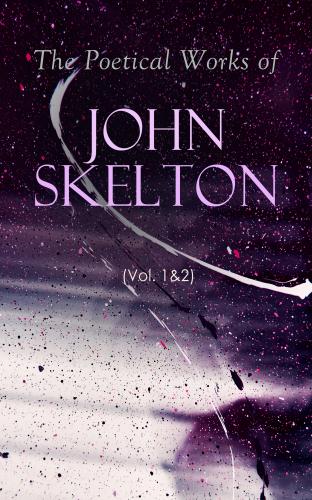12mo, n. d.
Heare after foloweth certain bokes Compiled by Master Skelton, Poet Laureat, whose names here after doth appere.
(Enumeration of pieces as above.)
Imprynted at London by Ihon Day.
Colophon,
Thus endeth these litle works compiled by maister Skelton Poet Laureat.
12mo, n. d.
Here after foloweth certayne bokes, cōpyled by mayster Skelton, Poet Laureat, whose names here after shall appere.
(Enumeration of pieces as above.)
Printed at London by Richard Lant, for Henry Tab, dwelling in Pauls churchyard, at the sygne of Judith.
Colophon,
Thus endethe these lytell workes compyled by mayster Skelton Poet Laureat. And prynted by Richard Lant, for Henry Tab, dwellyng in Poules churche yard at the sygne of Judith.
12mo, n. d. On the fly-leaf of the copy which I used, but perhaps not belonging to it, was pasted a woodcut representing the author, with the words “Skelton Poet” (copied from Pynson’s ed. of Dyuers Balettys, &c., and the same as that on the reverse of the last leaf of Kele’s ed. of Why come ye nat to Courte).
An edition printed for W. Bonham, 1547, 12mo, is mentioned by Warton, Hist. of E.P. ii. 336 (note), ed. 4to.
The various editions of these “certaine bokes” contain, besides the pieces specified on the title-page, the following poems—
“All noble men, of this take hede,” &c. [prefixed to the eds. of Why come ye nat to Courte.]
“Howe euery thing must haue a tyme.”
“Prayer to the Father of Heauen.”
“To the seconde Person.”
“To the Holy Ghost.”
Here after foloweth a litel boke called Colyn Cloute compyled by mayster Skelton poete Laureate.
Quis cōsurgat mecū adversus malignantes, aut quis stabit mecū adversus operantes iniquitatem. Nemo domine.
Colophon,
Imprinted at London by me Rycharde Kele dwellyng in the powltry at the long shop vnder saynt Myldredes chyrche.
12mo, n. d.
An edition by Kele, 4to, n. d., is mentioned in Typogr. Antiq. iv. 305. ed. Dibdin: but qy.?
Here after foloweth a litle booke called Colyn Clout compiled by master Skelton Poete Laureate.
Quis cōsurgat, &c. (as above.)
Colophon,
Inprinted at London in Paules Churche yarde at the Sygne of the Rose by Iohn Wyghte.
12mo, n. d.
Here after foloweth a litle boke called Colyn Clout compiled by master Skelton Poete Laureate.
Quis consurgat, &c. (as above.)
Colophon,
Imprynted at London in Paules Churche yarde at the Sygne of the Sunne by Anthony Kytson.
Colophon in some copies,
Imprynted at London in Paules Churche yarde at the Sygne of the Lambe by Abraham Veale.
12mo, n. d.
An edition Imprynted at London by—— [Thomas Godfray]. Cum priuilegio regali, is mentioned in Typogr. Antiq. iii. 71. ed. Dibdin.
Here after foloweth a lytell boke, whiche hath to name, Why come ye nat to courte, compyled by mayster Skelton poete Laureate.
Colophon,
Imprinted at london by me Richard kele dwellīg in the powltry at the longe shop vnder saynt myldredes chyrch.
12mo, n. d. On the reverse of the title-page is a woodcut representing two figures, one of them perhaps meant for Wolsey, the other headed “Skelton;” and on the reverse of the last leaf is a woodcut (copied from Pynson’s ed. of Dyuers Balettys, &c.) with the words “Skylton poyet.”
An edition by Kele, 4to, n. d., is mentioned in Typogr. Antiq. iv. 305. ed. Dibdin: but qy.?
Here after foloweth a little booke, whiche hath to name Whi come ye not to courte, compiled by mayster Skeltō Poete Laureate.
Colophon,
Imprynted at London in Paules churche yarde at the Sygne of the Rose by John Wyght.
12mo, n. d. On the reverse of the title-page is a woodcut, which I am unable to describe, because in the copy used by me it was much damaged as well as pasted over.
Here after foloweth a litle boke whyche hathe to name, whye come ye not to Courte. Compyled by mayster Skelton Poete Laureate.
Colophon,
Imprynted at London in Poules church yard at the syne of the sunne by Anthony Kytson.
Colophon in some copies,
Imprynted at London in Poules church yard at the syne of the Lamb by Abraham Veale.
Colophon in some other copies,
Imprynted at London in Foster lane by John Wallye.
12mo, n. d.
An edition, Imprynted at London, in Paules church yarde at the Sygne of the Bell by Robert Toy, is mentioned in Typogr. Antiq. iii. 576. ed. Dibdin.
Pithy pleasaunt and profitable workes of maister Skelton, Poete Laureate. Nowe collected and newly published. Anno 1568. Imprinted at London in Fletestreate, neare vnto saint Dunstones churche by Thomas Marshe. 12mo.
On the reverse of the title-page are the Latin lines, “Salve, plus decies,” &c. (see vol. i. 177); next, Churchyard’s verses, “If slouth and tract of time,” &c. (see Appendix I. p. lxxvi.); and then the contents of the volume are thus enumerated;
“Workes of Skelton newly collected by I.S. as foloweth.
1. The crowne of lawrel.
2. The bouge of court.
3. The duke of Albany.
4. Speake parrot.
5. Edward the fourth.
6. Against the Scottes. [Chorus de Dys contra Scottes, &c. Chorus de dis, &c. super triumphali victoria contra gallos, &c.]
7. Ware the hauke. [Libertas veneranda, &c. All noble men of this take hede, &c.]
8. Howe euery thinge must haue a time.
9. A prayer to the father of heauen.
10. To yᵉ second person.
11. To the holy ghost.
12. The tunning of Elinour Rumming.
13. The relucēt mirror.
14. Why come ye not to court.
15. Colyn Clout.
16. Philip sparowe.
17. Of a comly Coystrowne. [Contra alium Cantitātem & Organisantem Asinum, &c.]
18.
